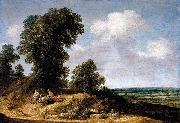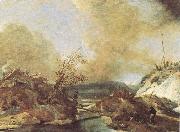Wholesale Oil Painting No Minimum |
|||||||||||
|
|
|||||||||||

|
|||||||||||
|
|
|
||||||||
Pieter de Hooch1629-1684 Dutch Pieter de Hooch Galleries De Hooch was born in Rotterdam to Hendrick Hendricksz de Hooch, a bricklayer, and Annetge Pieters, a midwife. He was the eldest of five children and outlived all of his siblings. He studied art in Haarlem under the landscape painter, Nicolaes Berchem. Beginning in 1650, he worked as a painter and servant for a linen-merchant and art collector named Justus de la Grange. His service for the merchant required him to accompany him on his travels to The Hague, Leiden, and Delft, to which he eventually moved. It is likely that de Hooch handed over most of his works to la Grange during this period in exchange for board and other benefits, as this was a common commercial arrangement for painters at the time, and a later inventory recorded that la Grange possessed eleven of his paintings. De Hooch was married in Delft in 1654 to Jannetje van der Burch, by whom he fathered seven children. While in Delft, de Hooch is also believed to have learned from the painters Carel Fabritius and Nicolaes Maes, who were both early members of the Delft School. He became a member of the painters' guild of Saint Luke in 1655, and had moved to Amsterdam by 1661. The early work of de Hooch, like most young painters of his time, was mostly composed of scenes of soldiers in stables and taverns, though he used these to develop great skill in light, color, and perspective rather than to explore an interest in the subject matter. After beginning his family in the mid-1650s, he switched his focus to domestic scenes and family portraits. His work showed astute observation of the mundane details of everyday life while also functioning as well-ordered morality tales. These paintings often exhibited a sophisticated and delicate treatment of light similar to those of Vermeer, who lived in Delft at the same time as de Hooch. 19th century art historians had assumed that Vermeer had been influenced by de Hooch's work, but the opposite is now believed. |
||||||||
|
|
||||||||
Dune Landscape
Dune Landscape Painting ID:: 70951 |
Medium Oil on panel
Medium Oil on panel |
|||||||
|
|
||||||||
Philips WouwermanDutch Baroque Era Painter, 1619-1668 Dutch painter and draughtsman. He was the eldest son of the painter Paulus [Pauwels] Joostens Wouwerman of Alkmaar (d 28 Sept 1642), whose two other sons, Pieter Wouwerman (1623-82) and Johannes Wouwerman (1629-66), also became painters. Philips probably received his first painting lessons from his father, none of whose work has been identified. According to Cornelis de Bie, Wouwerman was next apprenticed to Frans Hals, although no trace of Hals's influence is discernible in Wouwerman's work. Wouwerman is also reputed to have spent several weeks in 1638 or 1639 working in Hamburg in the studio of the German history painter Evert Decker (d 1647). While in Hamburg, he married Annetje Pietersz. van Broeckhof. On 4 September 1640 Wouwerman joined the Guild of St Luke in Haarlem, in which in 1646 he held the office of vinder (agent or 'finder'). Given the many southern elements in his landscapes, it has repeatedly been suggested that Wouwerman must have travelled to France or Italy, but there is no documentary evidence that he left his native Haarlem for more than short periods. |
||||||||
|
|
||||||||
|
|
Dune Landscape
Dune Landscape Painting ID:: 89097 |
between 1645(1645) and 1650(1650)
Medium oil on wood
cyf between 1645(1645) and 1650(1650) Medium oil on wood cyf |
||||||
|
|
||||||||
|
Philips Wouwerman Dutch Baroque Era Painter, 1619-1668 Dutch painter and draughtsman. He was the eldest son of the painter Paulus [Pauwels] Joostens Wouwerman of Alkmaar (d 28 Sept 1642), whose two other sons, Pieter Wouwerman (1623-82) and Johannes Wouwerman (1629-66), also became painters. Philips probably received his first painting lessons from his father, none of whose work has been identified. According to Cornelis de Bie, Wouwerman was next apprenticed to Frans Hals, although no trace of Hals's influence is discernible in Wouwerman's work. Wouwerman is also reputed to have spent several weeks in 1638 or 1639 working in Hamburg in the studio of the German history painter Evert Decker (d 1647). While in Hamburg, he married Annetje Pietersz. van Broeckhof. On 4 September 1640 Wouwerman joined the Guild of St Luke in Haarlem, in which in 1646 he held the office of vinder (agent or 'finder'). Given the many southern elements in his landscapes, it has repeatedly been suggested that Wouwerman must have travelled to France or Italy, but there is no documentary evidence that he left his native Haarlem for more than short periods. Dune Landscape between 1645(1645) and 1650(1650) Medium oil on wood cyf |
||||||||
|
|
||||||||
|
Prev Next
|
||||||||
|
|
||||||||
|
Related Paintings to Philips Wouwerman :. |
||||||||
|
|
||||||||
|
CONTACT US |


